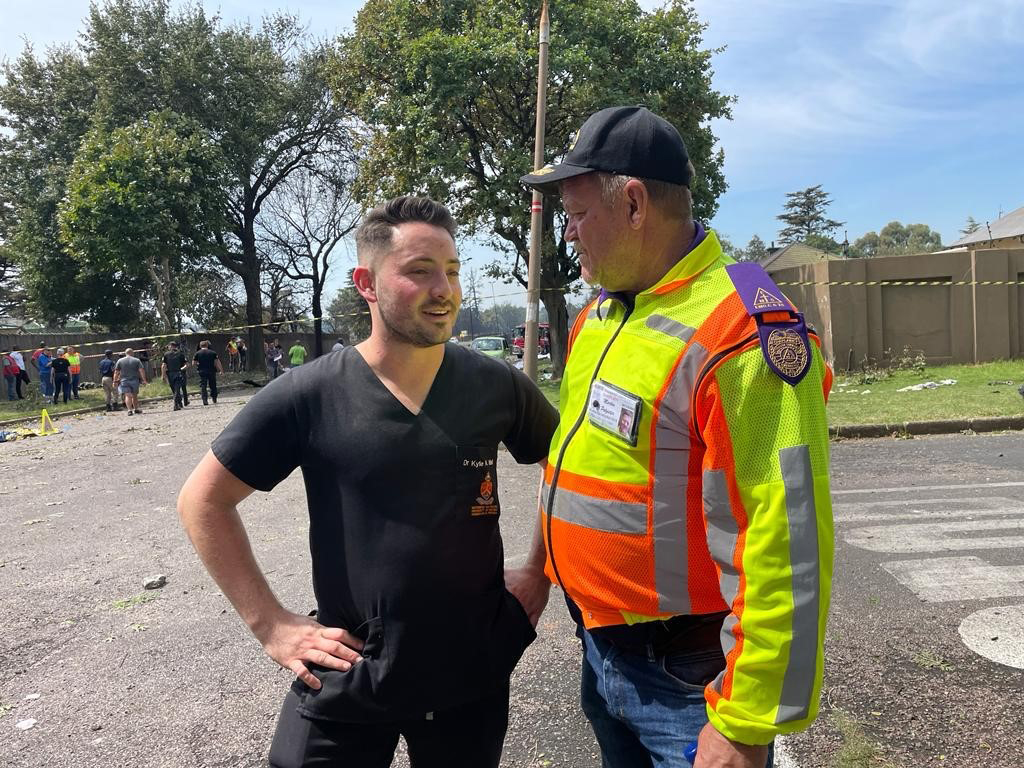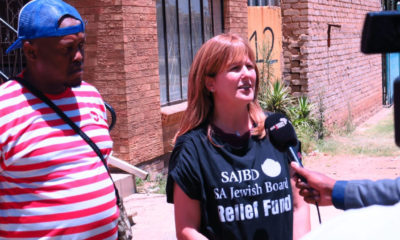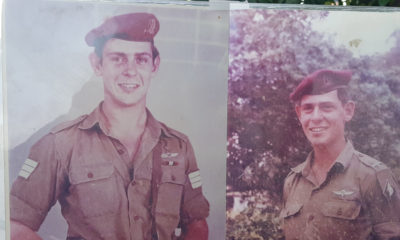
News

Jewish doctor escapes death amidst Boksburg explosion
Published
1 year agoon
Twenty-six-year-old Dr Kyle Winik was just 100m away from the gas tanker that exploded in Boksburg on the morning of 24 December, killing at least 37 people. “It doesn’t make sense that I’m okay,” says Winik, who was in the last days of his two-year internship at Tambo Memorial Hospital (TMH) when the tragedy occurred.
He says that if he hadn’t been in a car, he wouldn’t have survived. “There was a man standing next to me when the explosion happened. Afterwards, there were just pieces.”
Winik, who grew up in Johannesburg, attended King David Linksfield and studied at the University of Pretoria, knew many of the nurses from TMH who died in the explosion.
“I was about to turn off when I heard a very loud bang, saw a mushroom cloud, and then everything flying towards me. Instinctively, I went into the brace position. My first thought was, ‘I’m about to die.’ Seeing what was coming towards me, I thought, ‘There’s no way I’m getting out of this alive.’”
The accident left scores dead, injured, or missing. The fuel tanker was carrying 60 000 litres of liquefied petroleum gas. The driver took the wrong route under a bridge, about 100m from the hospital. When the tanker became stuck, he stopped to assess the damage. Noticing that the cap had been scraped off, he attempted to cordon off the area. At first there were three smaller explosions just after 07:00. This attracted crowds, resulting in casualties and fatalities when a large fourth explosion occurred about half an hour later.
On a whim, Winik decided that day to take his father’s car to work. “My car probably wouldn’t have withstood the force of the explosion,” he says. His father’s far more robust car is now a complete write-off.
“While I was still in the hospital, we heard bangs and felt tremors. As I was driving out, I saw fire. If I had exited right, I would have come to the bridge that the tanker was under,” he said. Instead, he doubled back so that he could film the fire to send to colleagues to warn them. It was then that the explosion occurred.
“I could feel the force of the explosion hitting the car, shattering glass. Feeling that I was cut all over, I knew I was still alive. In front of the driver’s side there was a huge hole. I looked in the mirror and saw I had blood on my face, but otherwise I was fine, although in shock.”
Getting out of the car, Winik recalled seeing people “with injuries not compatible with life. People were either dead or had burns that would kill them in the next few hours”.
Covered in glass and small burns, Winik got out of the car and tried to call for help, both for himself and those around him. He tried to phone his family, but because it was early, they didn’t answer. He tried to raise help from the hospital, but no one answered. It was “lonely and terrifying, realising I had escaped death, trying to call for help, and no one responding”, he says. He then called Hatzolah.
Hatzolah ensured that Winik was taken to hospital where he was treated for minor injuries. As his family was on holiday, friends took him home and cared for him. His family offered to return to Johannesburg, but he told them not to. “I needed space to process what had happened,” he said.
Hatzolah’s Yudi Singer says an ambulance team as well as an Advanced Life Support Incident Commander were dispatched as soon as they heard about the explosion. “Our Mass Casualty Incident (MCI) team, logistics team, and multiple dispatchers were on standby. Hatzolah established incident command, which was then handed over to Gauteng Disaster Management.
“We were faced with an overwhelming sense of panic and despair. We understood that this was an MCI with far-reaching consequences,” he says. “Hatzolah has a specialised MCI team which routinely practices and equips itself to be able to deal with large-scale incidents. Incident command is responsible for ensuring that the requirements at the scene are met and resources activated,” he says.
“I don’t think we totally comprehend the scale of damage and loss,” says Singer. “I’d like to acknowledge the hard work that Hatzolah has done to prepare for such incidents, which enabled us to kick into gear.”
“The Community Security Organisation took responsibility for tracking down community members possibly affected by the explosion,” says Operations Director Jevon Greenblatt. “There were a number who could potentially have been rostered at that hospital. Working with Hatzolah, we narrowed it down to one who couldn’t be accounted for. After trying to call him, we contacted his parents, who said he was probably in shul. We went to the shul to confirm it, and he was there.”
Winik is suffering from survivor’s guilt and post-traumatic stress symptoms. He has started his planned community service at Sebokeng Hospital, and is receiving trauma counselling. He says staff at TMH are still working, even after witnessing horrific scenes and losing friends. He hopes that the community can assist them.
He also attended a prayer service for the nurses who died. “It was extremely emotional, and I had to leave. They were people I worked with daily.”
He says the devastation in the area is “huge”, and there will be a ripple effect on healthcare in Johannesburg, which was already under stress after a fire at the Charlotte Maxeke Johannesburg Academic Hospital in April 2021.
The South African Jewish Board of Deputies (SAJBD) offered help from the moment the tragedy occurred. “The SAJBD together with The Angel Network (TAN) visited Boksburg to show support for our team on the ground: Fingertips of Africa, the Clive Mashishi Foundation, and Sibambisene Foundation,” says SAJBD Chairperson Professor Karen Milner.
“The blast was devastating,” she says. “Families lost breadwinners, parents lost children, people were badly burnt, and others had their houses destroyed. It was reassuring to know that our team was able to assess the needs of the community.
“Between the organisations, we were able to cater for more than 1 200 people at funerals, repair 120 windows, fix electricity including at the badly-affected old age home, and provide food packages. Equally importantly, Arielle Susman provided trauma counselling. Though the impact of the tragedy is unfathomable, knowing that we could assist meaningfully was reassuring.”
After visiting the community, TAN’s Glynne Wolman said it was “utterly devastating. I couldn’t get images out of my head. We can never forget what we witnessed. While we were there, they discovered an arm near the scene.
“A mother had lost her own mother and her 13-year-old daughter,” she says. “They haven’t buried the bodies because of administration issues. We will help to get this resolved. The area feels like a ghost town. We met people who were badly burnt when trying to help, and a mother who lost four of her seven children. Her husband died five months ago.” Wolman paid tribute to the many volunteers on the ground, especially Clive Mashishi, and says they “will probably need trauma counselling”.
Says Fingertips of Africa’s Yehuda Lazarus, “On 25 December, I went to hand out hampers and dresses donated by Limo Asseraf. We noticed the lack of food at funerals, and decided to help this way. We have catered for 12 funerals. Our staff have worked 24-hour shifts to make it happen. We hire unemployed youth.”
Community member Ros Sussman felt an urgent need to comfort people. “I survived a bomb blast in 1983. I remember the fear. For two years after that, I slept in my mother’s bed, and I was an adult. I went to Boksburg on Christmas Day, and you could feel the trauma in the air. I hope this community isn’t forgotten.”
Winik says Jewish doctors have always worked at TMH, and now it’s “time to give back” to a community in need. He will continue his dream of going into sports medicine, never forgetting how life can change in an instant.








